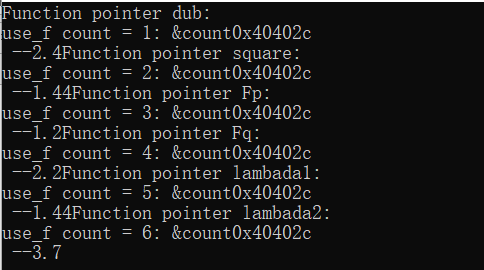泛型编程中,模板会根据传入类型的不同,生成多种实例,相对低效。
模板编程:
#include <iostream>
using namespace std;
//未使用函数包装器
template <typename T,typename F>
T use_f(T v, F f)
{
static int count = 0;
count++;
cout<<"use_f count = "<<count<<": &count"<<&count<<endl;
return f(v);
}
class Fp
{
private:
double z_;
public:
Fp(double z = 1.0):z_(z){}
double operator ()(double p) {return z_*p;}
};
class Fq
{
private:
double z_;
public:
Fq(double z = 1.0):z_(z){}
double operator ()(double p) {return z_+p;}
};
double dub(double x){return 2.0*x;}
double square(double x){return x*x;}
int main(int argc, char *argv[])
{
double y = 1.2;
cout<<"Function pointer dub:"<<endl;
cout<<" --"<<use_f(y,dub);
cout<<"Function pointer square:"<<endl;
cout<<" --"<<use_f(y,square);
cout<<"Function pointer Fp:"<<endl;
cout<<" --"<<use_f(y,Fp());
cout<<"Function pointer Fq:"<<endl;
cout<<" --"<<use_f(y,Fq());
cout<<"Function pointer lambada1:"<<endl;
cout<<" --"<<use_f(y,[](double u){return u*u;});
cout<<"Function pointer lambada2:"<<endl;
cout<<" --"<<use_f(y,[](double u){return u+2.5;});
return 0;
}

模板编程的优势是高度抽象,将算法统一封装,但是其根据类型实例化的特性也造成了其低效性。
以上执行结果,通过查看静态模板函数中,静态数据的地址,其产生了5个函数实例。代码量受传入类型的影响产生了巨大的增量。
通过std::function来减少模板的实例化:
#include <iostream>
#include <functional>
using namespace std;
//使用函数包装器
template <typename T,typename F>
T use_f(T v, F f)
{
static int count = 0;
count++;
cout<<"use_f count = "<<count<<": &count"<<&count<<endl;
return f(v);
}
class Fp
{
private:
double z_;
public:
Fp(double z = 1.0):z_(z){}
double operator ()(double p) {return z_*p;}
};
class Fq
{
private:
double z_;
public:
Fq(double z = 1.0):z_(z){}
double operator ()(double p) {return z_+p;}
};
double dub(double x){return 2.0*x;}
double square(double x){return x*x;}
int main(int argc, char *argv[])
{
double y = 1.2;
// cout<<"Function pointer dub:"<<endl;
// cout<<" --"<<use_f(y,dub);
// cout<<"Function pointer square:"<<endl;
// cout<<" --"<<use_f(y,square);
// cout<<"Function pointer Fp:"<<endl;
// cout<<" --"<<use_f(y,Fp());
// cout<<"Function pointer Fq:"<<endl;
// cout<<" --"<<use_f(y,Fq());
// cout<<"Function pointer lambada1:"<<endl;
// cout<<" --"<<use_f(y,[](double u){return u*u;});
// cout<<"Function pointer lambada2:"<<endl;
// cout<<" --"<<use_f(y,[](double u){return u+2.5;});
std::function<double(double)> fdub = dub;
std::function<double(double)> fsquare = square;
std::function<double(double)> fFp = Fp();
std::function<double(double)> fFq = Fq();
std::function<double(double)> lambada1 = [](double u){return u*u;};
std::function<double(double)> lambada2 = [](double u){return u+2.5;};
cout<<"Function pointer dub:"<<endl;
cout<<" --"<<use_f(y,fdub);
cout<<"Function pointer square:"<<endl;
cout<<" --"<<use_f(y,fsquare);
cout<<"Function pointer Fp:"<<endl;
cout<<" --"<<use_f(y,fFp);
cout<<"Function pointer Fq:"<<endl;
cout<<" --"<<use_f(y,fFq);
cout<<"Function pointer lambada1:"<<endl;
cout<<" --"<<use_f(y,lambada1);
cout<<"Function pointer lambada2:"<<endl;
cout<<" --"<<use_f(y,lambada2);
return 0;
}

所有的静态变量只有一个地址,也就是说模板 函数只产生了一个实例,其类型只需要匹配是一个std::function<double(double)>传入的对象即可,模板的效率大为提高。
但是看来好像代码量并未减少甚至还有些许增多,下面我们通过优化来解决这个问题。
熊掌与鱼:
#include <iostream>
#include <functional>
using namespace std;
//模板中使用函数包装器
template <typename T>
T use_f(T v, std::function<T(T)> f)
{
static int count = 0;
count++;
cout<<"use_f count = "<<count<<": &count"<<&count<<endl;
return f(v);
}
class Fp
{
private:
double z_;
public:
Fp(double z = 1.0):z_(z){}
double operator ()(double p) {return z_*p;}
};
class Fq
{
private:
double z_;
public:
Fq(double z = 1.0):z_(z){}
double operator ()(double p) {return z_+p;}
};
double dub(double x){return 2.0*x;}
double square(double x){return x*x;}
int main(int argc, char *argv[])
{
double y = 1.2;
//这里需要<double>使得std::function<T(T)>实例化为具体的对象
cout<<"Function pointer dub:"<<endl;
cout<<" --"<<use_f<double>(y,&dub);
cout<<"Function pointer square:"<<endl;
cout<<" --"<<use_f<double>(y,square);
cout<<"Function pointer Fp:"<<endl;
cout<<" --"<<use_f<double>(y,Fp());
cout<<"Function pointer Fq:"<<endl;
cout<<" --"<<use_f<double>(y,Fq());
cout<<"Function pointer lambada1:"<<endl;
cout<<" --"<<use_f<double>(y,[](double u){return u*u;});
cout<<"Function pointer lambada2:"<<endl;
cout<<" --"<<use_f<double>(y,[](double u){return u+2.5;});
return 0;
}

实例化与代码量都减少了,鱼和熊掌兼得。